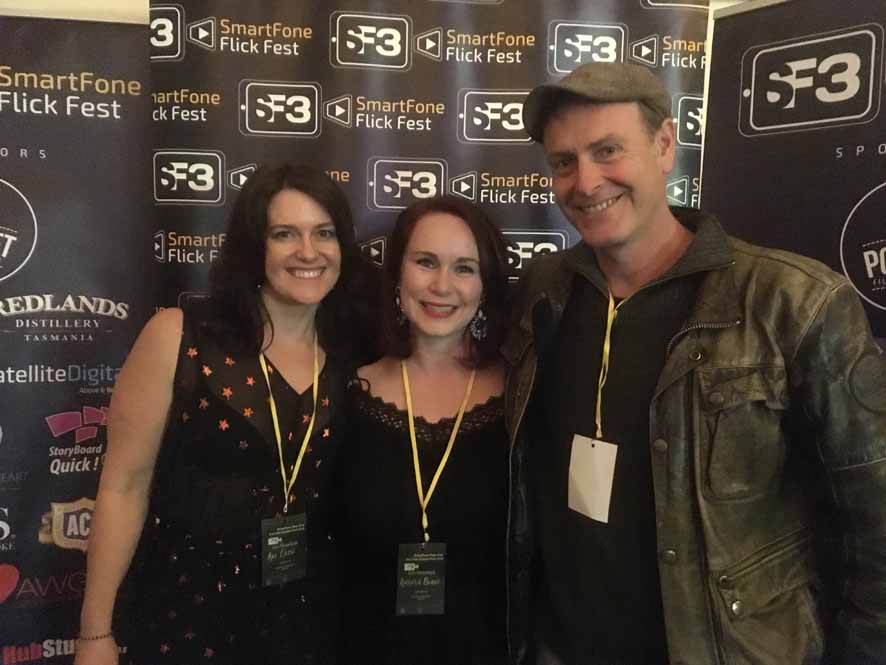“After about a minute your brain kicks and you think, oh wow, and when you start to realise what’s happening it’s a beautiful thing and you’re so engaged.”
With the second annual Sydney SmartFone Flick Fest concluding last Friday at the Chauvel Cinema in Paddington, Festival co-founder Angela Blake sat down to talk all things mobile filmmaking and this year’s winner, No Budget, produced by Sydney filmmaker Christopher Stollery on, as its title suggests, not much more than a novel idea.
“I just loved hearing the audience laughing, I loved being in the room with people experiencing the same thing for the first time and it’s magic,” said Blake.
“I hadn’t seen it in front of a big audience like that and it was a lot of fun to see the audience laugh on cue at the bits that I hoped would tickle them,” explained Stollery, who described the production as fun, but a “logistical nightmare.”
“It took nine months to do and a lot of people were very intrigued about how it was done and I’ve decided to stay mum on that, because like a good magic trick it’s only ruined by explaining it so I think I’ll let people try work out how it was done on their own,” said Stollery.
A great deal of fun and set, amidst other places, in Sydney’s Darlinghurst and inner city, No Budget boasted a couple of very surprising cameos.
“We had a number of people audition and decided that Hugo (Weaving) and David (Wenham) needed the work so we gave them a leg up and their careers have gone from strength to strength ever since,” Stollery quips. “It worked out perfectly, I texted Hugo the day after to let him know he had another film to put on his CV.”
“It has made me go back through some of the old scripts I’ve written where I thought they’re just way too expensive to make, but looking at them again going, if I took the same approach as I did on that, we could actually achieve it on a very modest budget,” said Stollery, excited by “the sort of incredible things being done just on the phone.”
Only one of the many films made with limited resources or support, Czech entry and Best Director and Screenplay winner Bubbles Don’t Lie, an audience favourite, was made as a result of innovative guerrilla filmmaking and an iPhone, with each filmmaker required to shoot their entry on a smartphone device.
“They couldn’t get permission so they just went in and had one take to get it, it’s indie filmmaking at its best,” commented Blake. “It’s incredible that they’re producing these international award-winning films on a zero-dollar budget.”
Sydney filmmaker Liam J. Phelan was one of the biggest winners of the night, taking out both Best Actor and the inaugural #Filmbreaker award for Don’t Give Up. Phelan was one of the many first time filmmakers entering the Festival.
“The #Filmbreaker Award is a new award that we made,” said Blake. “We always want to make filmmaking accessible and affordable and we never want to be unattainable and we always want to encourage people to make their first film. We do the #Filmbreaker award to acknowledge these first time filmmakers.”
“The organisers are doing something that’s really really great – a grassroots filmmaking festival, accessible to all,” explained Phelan, a young actor who shot the winning short with his roommate.
“I’d heard of films being done on smartphones before but never had any personal experience in doing it myself,” said Phelan. “From the moment we started rolling I couldn’t believe how steady the image was, how stable it all is, how capable the devices are and its absolutely incredible to know how many billions of people have one of these in their pockets at all times and that they’re just so capable, its surreal.”
An emerging trend, it is now not uncommon to hear about parts of or whole feature films being shot on a smartphone device. Traditional equipment being prohibitive to many emerging filmmakers, utilizing the new technology has allowed many burgeoning producers the opportunity to create short flicks and enter competitions like SF3.
“I think there’s a growing excitement around smartphone filmmaking,” said Blake. “Last year being our first year I feel like we had to convince a lot of people, a lot of sceptics that smartphone filmmaking is actually legitimate and that it’s a real thing. I feel we did that last year and that was the big hurdle.”
With a visibly larger crowd at the 2016 Festival Gala and a rise in the quality of entries, SF3 is looking to expand in coming years.
“We’re definitely looking at growing bigger and better and really getting into the kids market,” commented Blake.
“We have grand plans to hopefully next year have a separate kids screening just with all kids films, this year we did get quite a lot… we’re doing workshops for all ages, kids kind of play around but need that little bit of direction to make a proper film… We want to give kids a voice and we want to give them a way – there’s a way for them to tell their story so it’s just about educating and motivating them to do it.”
Beyond local audiences, this year’s Festival had a much stronger level of international participation, with several finalists entering films produced overseas.
“We set up the live-stream to truly make it an international event and we’ve been getting feedback from all the filmmakers who’d organised parties to watch it in their home countries and it was really cool,” said Blake. “It’s definitely an element we want to keep improving on because we are international, we live in a very connected world and we want to keep harnessing that and using the technology.”
The ‘Mobile SF3’ Festival will screen at the Casula Powerhouse on October 8, for more information about the Festival head to the Festival website

